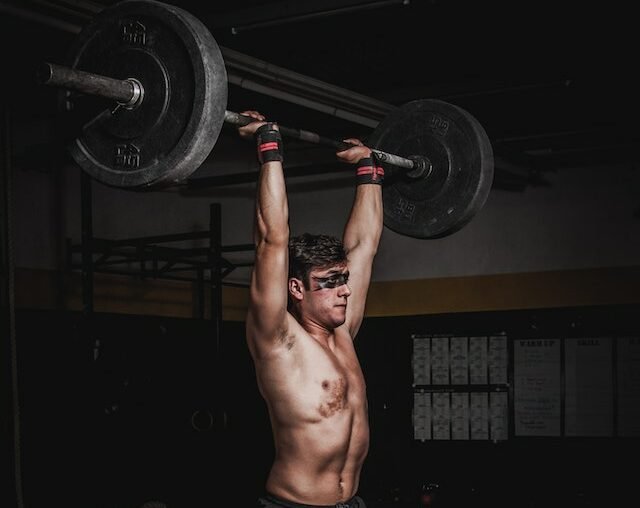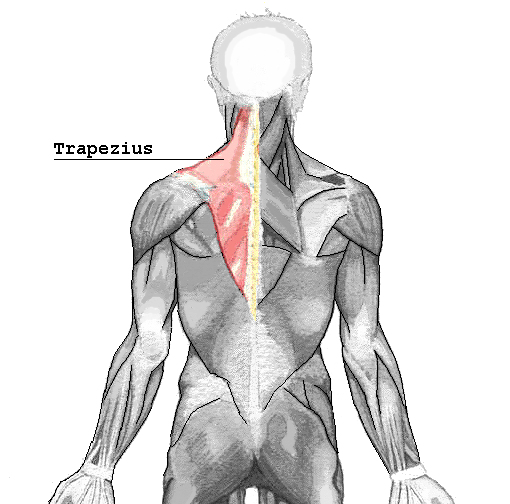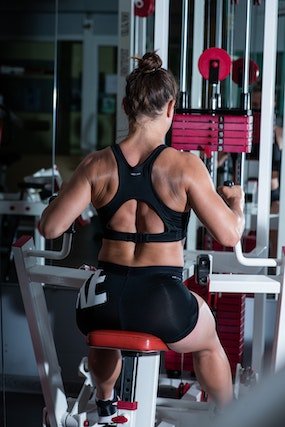
Does Shoulder Press Work Your Traps? All You Need To Know Here
Did you recently start doing shoulder press and notice that your traps felt sore for some strange reason?
There’s a lot of confusion about which exercises work which muscles. For example, does the shoulder press work the traps?
And if so, is it the best exercise for building traps? In this post, we’ll take a closer look at the shoulder press and explore whether or not it’s an effective trap workout.
Plus, we’ll recommend some alternative exercises that may be better for targeting your traps to get you hench in no time.
Does shoulder press work your traps?
The answer is yes and no. While shoulder press does not directly target the traps, they can still be beneficial for strengthening your traps if done correctly. When doing shoulder press, as you lift the weight, your scapula will rotate. This rotation works your traps eccentrically and concentrically as they lengthen and shorten during the movement. Therefore, the shoulder press does activate your traps, but in a secondary manner. While a shoulder press does help strengthen the traps, it’s not necessarily the most effective exercise for building them up. The best exercises for targeting and developing your traps are shrugs, deadlifts and farmers’ walks. When doing any overhead press exercises it’s important to ensure you have good form and you’re not trying to lift too heavy of a weight. You also need to stabilize the load as you press, which is where the traps come in, as they help to stabilize the load and guide it through the final phase of the movement.
Muscles involved
The shoulder press is a compound movement that works multiple muscle groups including the deltoids, triceps, trapezius, core and glutes.
The primary muscles used during a shoulder press are your anterior and middle deltoids, along with the triceps muscles.
The trapezius muscle, which is often referred to as the “traps” also plays a secondary role in this exercise and helps with stabilisation during the movement.
This can help to build strength and size in them but doesn’t primarily work the traps like some other exercises.
Additionally, the overhead press also helps to engage your core muscles as you stabilize the weight.
One other tip that’s worth knowing is that when doing the shoulder press, you should focus on making sure your neck does not hyperextend as this can put unnecessary stress on it.
Also, don’t forget to clench your glutes and core tightly during the movement to ensure you remain stable.
What’s its purpose?
The trapezius or “traps” is a large muscle group located in your upper back. Its primary function is to stabilise the shoulder blades and assist in upper body movements like pulling, pushing and lifting.
The traps are made up of three distinct parts- the upper, middle and lower traps. The upper traps are responsible for scapular elevation, the middle traps help retract your scapula and the lower traps work to depress and retract your shoulder blades.
Overall, the traps are an important muscle group for maintaining proper posture and form during any upper-body exercises and should be incorporated into your routine if you want to strengthen and develop the area.
Failure in taking time to properly train and engage the traps during a workout can result in poor form and even injury.

Scapula rotation
When it comes to shoulder press, the most important thing is to ensure you have proper form and mobilize your scapula correctly.
As mentioned earlier, when doing shoulder press, as you lift the weight, your scapula will rotate. This rotation works your traps eccentrically and concentrically as they lengthen and shorten during the movement.
It is important to ensure that you are engaging your traps correctly but not over-exerting them as this can result in injury.
To ensure you are doing shoulder press correctly and not putting unnecessary strain on your traps, focus on engaging your core and glutes to stabilize the weight throughout the lift.
By doing so, you will be able to transfer force more effectively through your body with less strain on your traps.
Related: Why Do I Feel Shoulder Press in My Biceps?
Stabilisation of the load
When doing any movement or exercise that involves your arms overhead, your traps will be working to stabilise the load.
This is because your traps connect directly to the humerus bone in your arm, and are responsible for stabilizing the shoulder joint.
Your traps also play a role in controlling and guiding the force that is generated through your arms during the shoulder press. This helps to ensure that the load does not move too quickly and is kept stable throughout the lift.
Therefore, while shoulder press does not directly target the traps, they can still be beneficial for strengthening your traps if done correctly.
By engaging your traps during the exercise, you can help ensure that you are doing the exercise with proper form and are not putting your body at risk of injury.
When doing pull-ups and lat pulldowns, it is important to engage your scapula and traps so that you can protect against injury and get the most out of the exercise.
Shrug it off
An easy way for you to feel the activation of your traps is to do shrugs. Shrugs are a great exercise for isolating and building the muscles in your shoulders and neck.
They involve simply lifting your shoulders up towards your ears and then slowly returning them down to the starting position.
It is important to ensure that you are not bouncing or jerking your shoulders during the exercise.
When you can shrug correctly (that sounds ridiculous as it’s a basic movement) you will really feel that mind-muscle connection with your traps and be able to isolate them better.
Shrugs can be done with weight, such as a barbell or dumbbell, or without weight. They can be done as part of a warm-up or cool-down routine or as an accessory exercise to supplement your shoulder press.
Traps and pulling exercises
While the shoulder press does help to activate the traps, it is important to remember that they are primarily worked by pulling exercises.
Exercises such as rows, lat pulldowns and pull-ups are the most effective exercises for targeting and developing your traps.
These exercises involve a much greater range of motion and can really help to isolate the traps.
Other exercises like face pulls, bent-over rear deltoid raises and band pull-aparts can also be really beneficial for strengthening the traps.
The shoulder press does have its place in your workout routine, but it is important to remember that it is not primarily a trap exercise.

Check your form
When it comes to shoulder press, the most important thing is to ensure you have proper form and are able to lift the weight competently.
By using good form and engaging your core and glutes to stabilize the weight throughout the lift, you can ensure that you are getting the most out of the exercise and are not over-exerting your traps and back muscles.
Keeping a strong and straight back throughout the movement is essential for optimal shoulder press execution and to prevent injury.
Have a good stance with your feet shoulder-width apart and ensure that you are not leaning forward or backwards when you press.
Keep those elbows close to your body and press the bar straight up with a slight outward rotation of the arms, this will help engage your traps and ensure you are lifting the weight correctly.
There is quite a lot going on mechanically when attempting to do an overhead shoulder press correctly, so it is important to focus on engaging the correct muscles and stabilising the load.
Related: Why do I feel overhead press in the middle of my back?
How much are you trying to lift?
When it comes to the shoulder press, you must be mindful of how much weight you are trying to lift.
If you are lifting too much weight, you may be putting yourself at risk of injury as the muscles fatigue and can no longer stabilise the load.
It is important to start light and gradually increase the weight as your strength progresses and you get better at the movement.
When trying to lift a load that’s realistically too heavy, your body will recruit other muscles to help stabilise, which can lead to injury.
With shoulder press, you are working more than just your deltoid muscles, so it is important to use a weight that is not too heavy and does not compromise the exercise.
When your body starts to lean forward or backwards to complete the lift, it’s a sign that the weight is too much and can put your back at risk of injury.
We have all seen those people in the gym who are trying to lift too much weight and end up dropping the barbell. Don’t be that person!
Make sure you’re doing everything you can to stay safe and lift with perfect form.
This ensures that you are able to maintain good form throughout the exercise and that your muscles are being worked correctly.
Final thoughts…
The shoulder press does activate your traps, but it is not the most effective exercise for targeting and developing them.
However, if done correctly, the shoulder press does allow you to work your traps and help strengthen them.
It is important to remember that form is essential when it comes to the shoulder press and that you need to make sure you are not lifting too much weight.
Start light and gradually increase the load as your strength progresses, and make sure you are engaging the correct muscles and stabilising the load throughout the movement.
With a bit of practice and patience, you’ll be able to get the most out of your shoulder press and reap all its benefits!
Do you feel your traps working when doing shoulder press? Let me know in the comments section below.


